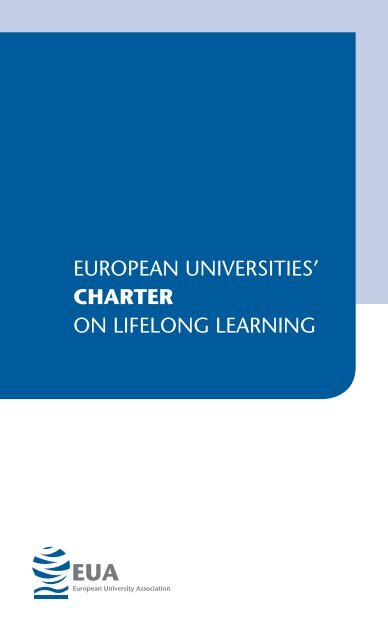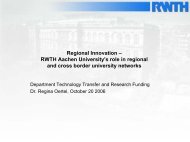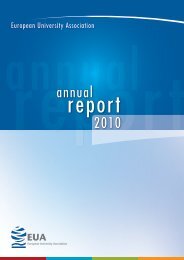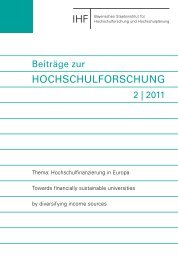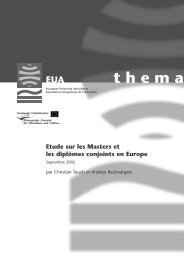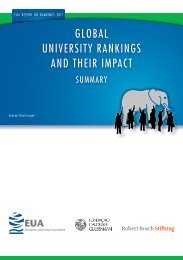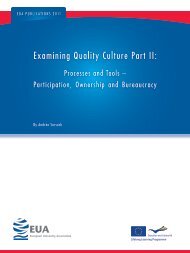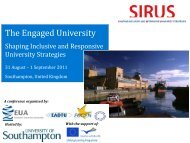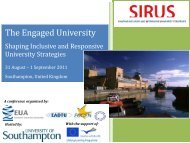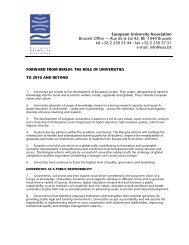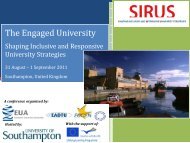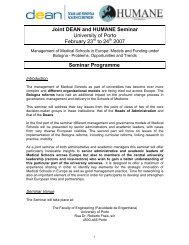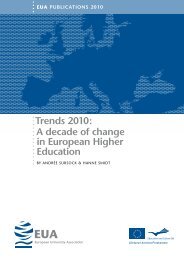Charter on Lifelong Learning - European University Association
Charter on Lifelong Learning - European University Association
Charter on Lifelong Learning - European University Association
You also want an ePaper? Increase the reach of your titles
YUMPU automatically turns print PDFs into web optimized ePapers that Google loves.
EUROPEAN UNIVERSITIES’<br />
CHARTER<br />
ON LIFELONG LEARNING
Copyright © 2008 by the <strong>European</strong> <strong>University</strong> Associati<strong>on</strong><br />
All rights reserved. This informati<strong>on</strong> may be freely used and copied for<br />
n<strong>on</strong>-commercial purposes, provided that the source is acknowledged<br />
(© <strong>European</strong> <strong>University</strong> Associati<strong>on</strong>).<br />
For ordering informati<strong>on</strong>, please c<strong>on</strong>tact publicati<strong>on</strong>s@eua.be or write<br />
to:<br />
<strong>European</strong> <strong>University</strong> Associati<strong>on</strong> asbl<br />
Rue d’Egm<strong>on</strong>t 13<br />
1000 Brussels, Belgium<br />
Tel +32 - 2 230 55 44<br />
Fax +32 - 2 230 57 51<br />
A free electr<strong>on</strong>ic versi<strong>on</strong> of this publicati<strong>on</strong> is available through<br />
www.eua.be<br />
ISBN: 9789078997009
PREAMBLE<br />
EUA has drafted this charter following <strong>on</strong> from a seminar <strong>on</strong> Lifel<strong>on</strong>g<br />
<strong>Learning</strong> held in the Sorb<strong>on</strong>ne in December 2007. At this time French<br />
Prime Minister François Fill<strong>on</strong> asked the <strong>European</strong> <strong>University</strong> Associati<strong>on</strong> to<br />
prepare a <str<strong>on</strong>g>Charter</str<strong>on</strong>g> <strong>on</strong> this key topic for Europe’s universities and for society<br />
in the future.<br />
The <str<strong>on</strong>g>Charter</str<strong>on</strong>g> has been elaborated <strong>on</strong> the basis of extensive c<strong>on</strong>sultati<strong>on</strong>, not <strong>on</strong>ly<br />
with EUA member universities and Rectors’ C<strong>on</strong>ferences, but also with a wide<br />
range of <strong>European</strong> higher educati<strong>on</strong> stakeholder organisati<strong>on</strong>s. 1<br />
Since their foundati<strong>on</strong> over 800 years ago, Europe’s universities have champi<strong>on</strong>ed<br />
research, fostered a civilised and tolerant society and prepared young people for<br />
their role in society and the ec<strong>on</strong>omy. They have also shown themselves to be<br />
remarkably resilient and adaptable instituti<strong>on</strong>s, c<strong>on</strong>tinually developing their role<br />
as society evolves.<br />
In the twenty first century new expectati<strong>on</strong>s and demands <strong>on</strong> Europe’s universities<br />
are mounting rapidly, as social and ec<strong>on</strong>omic development becomes geared<br />
around the c<strong>on</strong>cept of a Europe of Knowledge. <strong>European</strong> citizens need str<strong>on</strong>g,<br />
aut<strong>on</strong>omous, resp<strong>on</strong>sive and inclusive universities providing research-based<br />
educati<strong>on</strong> and learning in order to meet the many challenges ahead. These<br />
social, and ec<strong>on</strong>omic challenges are generated in particular by:<br />
• the increasing speed of globalisati<strong>on</strong>;<br />
• the demographic transformati<strong>on</strong> of Europe into ageing societies;<br />
• the rapid pace of technological change.<br />
These developments impact <strong>on</strong>, and require adaptati<strong>on</strong> in, society and from<br />
labour markets everywhere. Universities are key actors in this process.<br />
The <strong>European</strong> stage is set for lifel<strong>on</strong>g learning, and the decade of reforms that<br />
has taken place to develop the <strong>European</strong> higher educati<strong>on</strong> and research areas<br />
now needs to be c<strong>on</strong>solidated and taken forward to address lifel<strong>on</strong>g learning<br />
challenges, taking account of existing achievements and good practice in<br />
Europe’s universities to meet diversified learner needs. Currently the terminology<br />
of lifel<strong>on</strong>g learning embraces many c<strong>on</strong>cepts – including initial educati<strong>on</strong> for<br />
disadvantaged groups, c<strong>on</strong>tinuing educati<strong>on</strong> and training for well-qualified<br />
graduates, and post-retirement opportunities for cultural enrichment – and is<br />
subject to c<strong>on</strong>siderable local, regi<strong>on</strong>al and nati<strong>on</strong>al interpretati<strong>on</strong>.<br />
For a <strong>European</strong> dialogue to be effective in guiding local and nati<strong>on</strong>al developments,<br />
it is important to define better the overarching c<strong>on</strong>cepts and practices, and to<br />
clarify more precisely the particular c<strong>on</strong>tributi<strong>on</strong> to the lifel<strong>on</strong>g learning agenda<br />
that can be made by creating a culture of inclusive and resp<strong>on</strong>sive <strong>European</strong><br />
universities.<br />
1 List of organisati<strong>on</strong>s can be found in annex.<br />
EUROPEAN UNIVERSITIES’ CHARTER ON LIFELONG LEARNING<br />
3
EUROPEAN UNIVERSITIES’ CHARTER ON LIFELONG LEARNING<br />
4<br />
Universities are am<strong>on</strong>g a spectrum of instituti<strong>on</strong>s that need to resp<strong>on</strong>d to these<br />
issues. They have a particular opportunity to provide research-based higher<br />
educati<strong>on</strong> for lifel<strong>on</strong>g learners.<br />
Currently <strong>European</strong> societies are missing out <strong>on</strong> a huge pool of readily available<br />
human talent, and comparing higher educati<strong>on</strong> participati<strong>on</strong> rates in Europe<br />
with those in other world regi<strong>on</strong>s makes disturbing reading and calls for acti<strong>on</strong>.<br />
Widening access to higher educati<strong>on</strong> is not about introducing less qualified<br />
students, but rather about supporting all learners with the potential to benefit<br />
both themselves and society through participating in higher educati<strong>on</strong>. This<br />
means reaching out to an increasingly broad range of learners with different<br />
motivati<strong>on</strong>s and interests: not <strong>on</strong>ly offering programmes for professi<strong>on</strong>al<br />
development adapted to a fast-changing labour market, but also catering for the<br />
growing demand for pers<strong>on</strong>al development opportunities through the cultural<br />
enrichment that universities offer. There is also an urgent need for debate <strong>on</strong> how<br />
lifel<strong>on</strong>g learning provisi<strong>on</strong> that will be of benefit to individuals, employers and<br />
society as a whole can best, and most fairly, be funded.<br />
This impetus to develop more inclusive and resp<strong>on</strong>sive universities is not a call<br />
for revoluti<strong>on</strong>, but rather for evoluti<strong>on</strong>. It is often assumed that lifel<strong>on</strong>g learning<br />
provisi<strong>on</strong> is different in nature to the provisi<strong>on</strong> of educati<strong>on</strong> to traditi<strong>on</strong>al<br />
students. In reality, the key challenge is to find ways to open up a wider range of<br />
educati<strong>on</strong>al services to new learners and to returning learners, and to ensuring<br />
c<strong>on</strong>tinuing opportunities for learners throughout their lives. Expanding the range<br />
of learners becomes the key strategic issue, and the key activities for universities<br />
to develop are the establishment of systems for fair assessment and validati<strong>on</strong><br />
of all forms of prior learning, and providing relevant, creative and innovative<br />
educati<strong>on</strong>al programmes.<br />
Universities are also aware of the need to engage in and reinforce dialogue<br />
with society more broadly – with employers and employee organisati<strong>on</strong>s, as<br />
well as with parents and students. This can best be achieved by strengthening<br />
partnerships at different levels, with particular attenti<strong>on</strong> to the local level where<br />
needs are most acutely perceived and expressed.<br />
The purpose of this <str<strong>on</strong>g>Charter</str<strong>on</strong>g>, which is written in the form of commitments from<br />
universities in addressing the development and implementati<strong>on</strong> of lifel<strong>on</strong>g<br />
learning strategies, with a set of matching commitments for governments and<br />
regi<strong>on</strong>al partners to make, is to assist Europe’s universities in developing their<br />
specific role as lifel<strong>on</strong>g learning instituti<strong>on</strong>s forming a central pillar of the Europe<br />
of Knowledge.
UNIVERSITIES COMMIT TO:<br />
1. Embedding c<strong>on</strong>cepts of widening access and lifel<strong>on</strong>g learning in their<br />
instituti<strong>on</strong>al strategies.<br />
Universities will grasp the opportunity to address lifel<strong>on</strong>g learning centrally in their<br />
missi<strong>on</strong> and strategy as part of a wider definiti<strong>on</strong> of excellence. The complexity of<br />
lifel<strong>on</strong>g learning c<strong>on</strong>cepts has to be acknowledged and explored as a key aspect<br />
of developing the c<strong>on</strong>tributi<strong>on</strong> of universities to a culture of lifel<strong>on</strong>g learning.<br />
2. Providing educati<strong>on</strong> and learning to a diversified student populati<strong>on</strong>.<br />
<strong>European</strong> universities will resp<strong>on</strong>d positively to the increasingly diverse demand<br />
from a broad spectrum of students – including post sec<strong>on</strong>dary students, adult<br />
learners, professi<strong>on</strong>als who seek to up-grade skills for the workplace, senior<br />
citizens taking advantage of their increasing l<strong>on</strong>gevity to pursue cultural interests,<br />
and others – for high quality and relevant higher educati<strong>on</strong> throughout their lifetime.<br />
<strong>European</strong> universities recognise the important c<strong>on</strong>tributi<strong>on</strong> that a diversified<br />
student body will make to the development of a culture of success and innovati<strong>on</strong><br />
in the instituti<strong>on</strong> and wider society, and the need to think how far different types<br />
of learners can interact together in a supportive mutual learning envir<strong>on</strong>ment.<br />
3. Adapting study programmes to ensure that they are designed to widen<br />
participati<strong>on</strong> and attract returning adult learners.<br />
Flexible and transparent learning paths need to be in place for all learners to<br />
access and succeed in higher educati<strong>on</strong> in all its different forms. It is an essential<br />
resp<strong>on</strong>sibility of universities to ensure that this educati<strong>on</strong>al offer is always of high<br />
quality.<br />
<strong>European</strong> universities acknowledge the diversity of individual learner needs and<br />
therefore their resp<strong>on</strong>sibility to adapt programmes and ensure the development<br />
of appropriate learning outcomes in a learner-centred perspective. They also<br />
pledge to play their part in promoting widening participati<strong>on</strong> and c<strong>on</strong>tinuing<br />
educati<strong>on</strong>.<br />
4. Providing appropriate guidance and counselling services.<br />
EUROPEAN UNIVERSITIES’ CHARTER ON LIFELONG LEARNING<br />
Relevant academic and professi<strong>on</strong>al guidance, as well as other psychological<br />
counselling, should be available for all qualified potential students when needed.<br />
This support should be relevant to learners of all ages, and from all social and<br />
cultural backgrounds.<br />
5
EUROPEAN UNIVERSITIES’ CHARTER ON LIFELONG LEARNING<br />
6<br />
5. Recognising prior learning.<br />
To ensure that all with the potential to benefit from higher educati<strong>on</strong> provisi<strong>on</strong><br />
are enabled to do so, it is essential for universities to develop systems to assess<br />
and recognise all forms of prior learning. This is particularly important in the<br />
c<strong>on</strong>text of lifel<strong>on</strong>g learning in a global era where knowledge is acquired in many<br />
different forms and places.<br />
6. Embracing lifel<strong>on</strong>g learning in quality culture.<br />
Europe’s universities have taken important steps in developing internal quality<br />
culture, assuming prime resp<strong>on</strong>sibility for the quality of their provisi<strong>on</strong>. This<br />
work will adapt to an evolving framework for lifel<strong>on</strong>g learning in order to ensure<br />
that an appropriate range of targeted learner support services are provided for<br />
increasing numbers of more diverse learners.<br />
7. Strengthening the relati<strong>on</strong>ship between research, teaching and innovati<strong>on</strong><br />
in a perspective of lifel<strong>on</strong>g learning.<br />
Universities’ research and innovati<strong>on</strong> missi<strong>on</strong>s can be strengthened through<br />
lifel<strong>on</strong>g learning strategies, and universities’ specific c<strong>on</strong>tributi<strong>on</strong> to lifel<strong>on</strong>g<br />
learning should be underpinned by research. Researchers should also be<br />
recognised as a fine example of lifel<strong>on</strong>g learners whose own educati<strong>on</strong>al needs<br />
are c<strong>on</strong>tinually evolving, also taking account of the changing skills required<br />
by the labour market. Lifel<strong>on</strong>g learning can also be a source of new research<br />
methodologies and topics.<br />
8. C<strong>on</strong>solidating reforms to promote a flexible and creative learning<br />
envir<strong>on</strong>ment for all students.<br />
In creating the <strong>European</strong> higher educati<strong>on</strong> and research areas, Europe’s universites<br />
are engaged <strong>on</strong> a path of major reforms that places all learners at the centre.<br />
Universities now need to exploit the potential of these reform processes and their<br />
tools (ECTS, Diploma Supplement, <strong>European</strong> Standards and Guidelines for Quality<br />
Assurance, Qualificati<strong>on</strong>s Frameworks, etc) to enhance the development of a<br />
creative lifel<strong>on</strong>g learning envir<strong>on</strong>ment that is open to a more diverse populati<strong>on</strong><br />
of learners, and thus resp<strong>on</strong>ds to societal needs for the modernisati<strong>on</strong> of higher<br />
educati<strong>on</strong>. Fully integrating lifel<strong>on</strong>g learning to the missi<strong>on</strong> of universities is<br />
essential to enhance the creativity and innovati<strong>on</strong> profiles of instituti<strong>on</strong>s.
9. Developing partnerships at local, regi<strong>on</strong>al, nati<strong>on</strong>al and internati<strong>on</strong>al<br />
level to provide attractive and relevant programmes.<br />
Providing relevant educati<strong>on</strong>al provisi<strong>on</strong> in a lifel<strong>on</strong>g learning c<strong>on</strong>text cannot be<br />
d<strong>on</strong>e by instituti<strong>on</strong>s <strong>on</strong> their own. The need for structured partnerships – with<br />
a range of other educati<strong>on</strong>al instituti<strong>on</strong>s, employers, employees’ organisati<strong>on</strong>s<br />
(trade uni<strong>on</strong>s) as well as with other stakeholders – is essential if provisi<strong>on</strong> is to be<br />
resp<strong>on</strong>sive, flexible and innovative.<br />
10. Acting as role models of lifel<strong>on</strong>g learning instituti<strong>on</strong>s.<br />
EUROPEAN UNIVERSITIES’ CHARTER ON LIFELONG LEARNING<br />
Universities are not <strong>on</strong>ly providers of higher educati<strong>on</strong> and research, but also<br />
major employers in their own right. They therefore have the potential to act as<br />
role models in society by offering lifel<strong>on</strong>g learning opportunities for their own<br />
employees – whether academic, administrative or technical and auxiliary staff.<br />
They should also be key actors in lobbying for coherent policy development in<br />
nati<strong>on</strong>al systems.<br />
7
EUROPEAN UNIVERSITIES’ CHARTER ON LIFELONG LEARNING<br />
8<br />
Europe’s universities cannot realise these commitments without the<br />
c<strong>on</strong>certed acti<strong>on</strong>s of governments and regi<strong>on</strong>al partners in providing<br />
appropriate legal envir<strong>on</strong>ments and funding. The following commitments are<br />
therefore expected from governments to ensure that a suitable envir<strong>on</strong>ment<br />
is created for universities to develop their c<strong>on</strong>tributi<strong>on</strong> to lifel<strong>on</strong>g learning.<br />
GOVERNMENTS COMMIT TO:<br />
1. Recognising the university c<strong>on</strong>tributi<strong>on</strong> to lifel<strong>on</strong>g learning as a major<br />
benefit to individuals and society.<br />
Governments have a resp<strong>on</strong>sibility to ensure that universities are valued for their<br />
c<strong>on</strong>tributi<strong>on</strong> to lifel<strong>on</strong>g learning, and that this is not perceived as a minor additi<strong>on</strong><br />
to the roles of universities. It is a major cultural shift to resp<strong>on</strong>d to the demands<br />
of a fast evolving lifel<strong>on</strong>g learning society and of l<strong>on</strong>g-term labour market needs,<br />
and requires significant financial investment.<br />
2. Promoting social equity and an inclusive learning society.<br />
Governments should make efforts to ensure that lifel<strong>on</strong>g learning achievements<br />
are valued by individuals, public and private employers and other actors, and<br />
that a culture of learning throughout life is shared as a comm<strong>on</strong> societal goal.<br />
Citizens need to be provided with informati<strong>on</strong> <strong>on</strong> accessing lifel<strong>on</strong>g learning<br />
educati<strong>on</strong>al opportunities, while Europe’s universities need to be supported to<br />
ensure that such opportunities are open to all who have the potential to benefit<br />
from higher educati<strong>on</strong> at whatever time in their life is appropriate.<br />
3. Including lifel<strong>on</strong>g learning objectives in the missi<strong>on</strong>s and work of nati<strong>on</strong>al<br />
QA agencies and systems.<br />
Most countries have now developed quality assurance systems for higher<br />
educati<strong>on</strong> that have a major impact <strong>on</strong> the nature of programmes developed.<br />
Attenti<strong>on</strong> to issues of lifel<strong>on</strong>g learning in quality assurance processes is therefore<br />
a necessity to ensure that lifel<strong>on</strong>g learning is recognised as a nati<strong>on</strong>al priority.<br />
4. Supporting the development of appropriate guidance and counselling<br />
services.<br />
Professi<strong>on</strong>al academic guidance, careers advice and welfare services are essential<br />
for all learners to find their way successfully through the more flexible provisi<strong>on</strong> that
is being developed by universities, but particularly important to those individuals<br />
most at risk of failing to complete higher educati<strong>on</strong> programmes and who have<br />
little support from family, friends and colleagues. Irrespective of whether services<br />
are delivered within or outside higher educati<strong>on</strong> instituti<strong>on</strong>s, governments have<br />
a resp<strong>on</strong>sibility to ensure high professi<strong>on</strong>al standards. Governments also need to<br />
ensure that guidance, careers and counselling services are linked up in a lifel<strong>on</strong>g<br />
learning perspective to provide c<strong>on</strong>tinuous support to citizens at all levels of<br />
educati<strong>on</strong>. This support should be relevant to students of all ages, and from all<br />
social and cultural backgrounds.<br />
5. Recognising prior learning.<br />
EUROPEAN UNIVERSITIES’ CHARTER ON LIFELONG LEARNING<br />
Governments have the resp<strong>on</strong>sibility to support and motivate instituti<strong>on</strong>s in the<br />
recogniti<strong>on</strong> of all forms of prior learning. This task can be facilitated through the<br />
provisi<strong>on</strong> of appropriate incentives to instituti<strong>on</strong>s, and by ensuring full integrati<strong>on</strong><br />
of prior learning in qualificati<strong>on</strong> frameworks.<br />
6. Removing specific legal obstacles that prevent many potential learners<br />
from returning to higher educati<strong>on</strong>.<br />
Governments should address the systemic obstacles that discourage many<br />
potential learners from taking advantage of lifel<strong>on</strong>g learning opportunities. This<br />
means taking acti<strong>on</strong> <strong>on</strong> matters such as social security rights, precariousness of<br />
employment rights, lack of financial support for lifel<strong>on</strong>g learning, and loss of<br />
pensi<strong>on</strong> c<strong>on</strong>tributi<strong>on</strong>s during periods of study.<br />
7. Ensuring aut<strong>on</strong>omy and developing incentives for lifel<strong>on</strong>g learning<br />
universities.<br />
Governments have a resp<strong>on</strong>sibility to ensure that universities have sufficient<br />
aut<strong>on</strong>omy to develop their own resp<strong>on</strong>ses to lifel<strong>on</strong>g learning challenges and<br />
to decide their own admissi<strong>on</strong> requirements, but also sufficient incentives to be<br />
rewarded for pursuing this key missi<strong>on</strong>. Major progess in developing lifel<strong>on</strong>g<br />
learning provisi<strong>on</strong> can <strong>on</strong>ly take place if such a framework of aut<strong>on</strong>omy with<br />
incentives is achieved.<br />
8. Encouraging partnerships at regi<strong>on</strong>al level with local authorities,<br />
employers and agencies.<br />
The benefits of high quality lifel<strong>on</strong>g learning provisi<strong>on</strong> will largely be realised in<br />
Europe’s regi<strong>on</strong>s, and regi<strong>on</strong>al development agencies, local employers, as well<br />
as employees’ organisati<strong>on</strong>s (uni<strong>on</strong>s) therefore have a high stake in this agenda.<br />
Regi<strong>on</strong>al partnerships with higher educati<strong>on</strong> instituti<strong>on</strong>s and social partners need<br />
to be strengthened as they are vital to the successful planning and delivery of<br />
lifel<strong>on</strong>g learning educati<strong>on</strong>al services.<br />
9
EUROPEAN UNIVERSITIES’ CHARTER ON LIFELONG LEARNING<br />
10<br />
9. Informing and encouraging citizens to take advantage of lifel<strong>on</strong>g learning<br />
opportunities offered by universities.<br />
As a key aspect of the implementati<strong>on</strong> of nati<strong>on</strong>al lifel<strong>on</strong>g learning strategy,<br />
governments have a special resp<strong>on</strong>sibility to ensure that citizens are informed<br />
and aware of the varied and diverse opportunities of university based lifel<strong>on</strong>g<br />
learning provisi<strong>on</strong>.<br />
10. Acting as role models of lifel<strong>on</strong>g learning instituti<strong>on</strong>s.<br />
Like universities, governments can set standards in society by acting as role<br />
models for the policies that they advocate. Governments should ensure that<br />
public sector employees therefore are encouraged to benefit from the range of<br />
lifel<strong>on</strong>g learning opportunities offered by the universities and other providers.<br />
Brussels, July 2008
Annex: List of <strong>European</strong> higher educati<strong>on</strong> stakeholder organisati<strong>on</strong>s<br />
c<strong>on</strong>sulted during the drafting process<br />
• Business Europe<br />
• <strong>European</strong> Associati<strong>on</strong> for the Educati<strong>on</strong> of Adults (EAEA)<br />
• <strong>European</strong> Associati<strong>on</strong> of Distance Teaching Universities (EADTU)<br />
• <strong>European</strong> Access Network (EAN)<br />
• Educati<strong>on</strong> Internati<strong>on</strong>al (EI)<br />
• <strong>European</strong> Students’ Uni<strong>on</strong> (ESU)<br />
• <strong>European</strong> Trade Uni<strong>on</strong> C<strong>on</strong>federati<strong>on</strong> (ETUC)<br />
• <strong>European</strong> <strong>University</strong> C<strong>on</strong>tinuing Educati<strong>on</strong> Network (EUCEN)<br />
• <strong>European</strong> Associati<strong>on</strong> of Instituti<strong>on</strong>s in Higher Educati<strong>on</strong> (EURASHE)<br />
• Forum Européen De l’Orientati<strong>on</strong> Académique (FEDORA)
<strong>European</strong> <strong>University</strong> Associati<strong>on</strong> asbl<br />
Rue d’Egm<strong>on</strong>t 13<br />
1000 Brussels<br />
Belgium<br />
Tel: +32 - 2 230 55 44<br />
Fax: +32 - 2 230 57 51<br />
www.eua.be<br />
The <strong>European</strong> <strong>University</strong> Associati<strong>on</strong> (EUA) is<br />
the representative organisati<strong>on</strong> of universities<br />
and nati<strong>on</strong>al rectors’ c<strong>on</strong>ferences in 46<br />
<strong>European</strong> countries. EUA plays a crucial role<br />
in the Bologna process and in influencing EU<br />
policies <strong>on</strong> higher educati<strong>on</strong>, research and<br />
innovati<strong>on</strong>. Thanks to its interacti<strong>on</strong> with a<br />
range of other <strong>European</strong> and internati<strong>on</strong>al<br />
organisati<strong>on</strong>s EUA ensures that the<br />
independent voice of <strong>European</strong> universities is<br />
heard wherever decisi<strong>on</strong>s are being taken that<br />
will impact <strong>on</strong> their activities.<br />
The Associati<strong>on</strong> provides a unique expertise<br />
in higher educati<strong>on</strong> and research as well as a<br />
forum for exchange of ideas and good practice<br />
am<strong>on</strong>g universities. The results of EUA’s<br />
work are made available to members and<br />
stakeholders through c<strong>on</strong>ferences, seminars,<br />
website and publicati<strong>on</strong>s.


